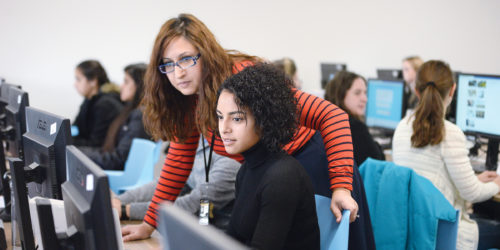
Navigating Religious Accommodation Requests
By: Dr. Sara Kafashan and Dr. Lauren Spring, with Sandrine Uwimana
Some faculty may feel caught off guard if/when student requests for religious accommodations come their way. When navigating such religious accommodation requestions, it is imperative for Conestoga faculty to not only adhere to Conestoga’s Religious Holy Day and Spiritual Observance Policy and Procedure, but also the Ontario Human Rights Code (OHRC). This is because under the OHRC, religious accommodation requests fall under the protected ground of “creed” and must be accommodated to the point of undue hardship.
Each religious accommodation request can present with unique circumstances and situations. Accordingly, such requests require (a) careful consideration; (b) clear communication between the faculty, student, and Chair; and at times, (c) creative, out-of-the-box thinking. This hub post serves as a resource to guide faculty as they navigate potential religious accommodation requests. We first begin with some examples of common religious accommodation requests anda basic overview of student, faculty and chair responsibilities. We then offer some specific program and course examples of how Conestoga Chairs have skillfully and thoughtfully navigated some challenging requests. This hub post concludes with sample templates provided by Conestoga’s Student Rights and Responsibilities Specialist, Sandrine Uwimana that you are welcome to use should you need/want to document a conversation with a student regarding a religious accommodation request.
Conestoga’s Student Rights and Responsibilities Specialist, Sandrine Uwimana, has shared examples of requests that students have made and explained student, faculty and Chair responsibilities in these situations:
Examples of Religious Accommodation Requests:
- Requesting time off from class or rescheduling an exam, lab or assignment, possibly without needing to make it up later.
- Requesting for timetable change due to religious reasons
- Following a particular dress code for religious reasons, e.g. having a bracelet or specific jewelry
- Taking short breaks from class for daily prayers, fasting, or breaking a fast.
- Requesting to be excused from or to defer other mandatory activities listed in a course outline, instructional plans, the course outcome, or lab.
- Requesting to be excused from classes or exams for occasions such as Holy Days, Friday prayers at 1:00 p.m. for the Muslim community, or during the Sabbath hours (Adventist and Jewish observers)
- Requesting not to be paired with or to practice classroom activities on different sex peers.
Other requests regarding classes, assignments, attendance, and participation may be based on individual religious beliefs.
Student, Faculty, and Chair Responsibilities
STUDENT:
- Students must inform teaching staff about creeds and if these reasons might affect classroom practices.
- Students should provide at least three weeks advance notice for any request (and ideally within the first 3 weeks of a course starting) and give ample time for a response.
- Students should specify the accommodations they need.
- Students should request the accommodation with honesty and goodwill, remaining open-minded and practical.
FACULTY
- Instructors will strive to avoid scheduling tests, exams, or mandatory activities during religious observation times.
- If unavoidable, students should be given opportunities to make up missed work, especially in lab courses.
- When rescheduling is necessary, clear procedures will be provided for students to arrange alternative times.
- If a student requests an accommodation and a faculty member is unsure of what to do, they should consult the Chair within a reasonable time.
- If further support is needed to resolve the issue, the faculty will bring the request to the Chair.
CHAIR
In the interest of fairness, the Chair shall ensure that no student is disadvantaged due to religious beliefs while also considering the impact on the broader community. This commitment to fairness ensures that all students can practice their beliefs without fear of academic repercussions. This can be accomplished through the following. The Chair will:
- Accommodate students missing an exam due to a religious observance without incurring any penalties.
- Respect the dignity of the person seeking accommodation
- Reply to any request within a reasonable time
- Deal in good faith and consider alternatives
- Evaluate individual accommodation requests and, when necessary,meet with students as soon as possible.
- Consult with SRR members or request support if needed.
- Approve exceptions based on extenuating circumstances. If a faculty member is unable or unwilling to grant a student’s religious accommodation request, the student may consult with their Academic Chair (see Conestoga’s Procedure).
Navigating Religious Accommodation Requests: Examples from Conestoga Chairs
Example 1: Culinary Arts overseen by Chair Brad Lomanto
In Conestoga’s culinary programs, students often work in practical learning labs to practice skills and techniques aligned with program and course outcomes. Within these programs, some students have requested to not work with meat, citing religious and spiritual reasons. Such requests were taken into consideration by faculty members and the Chair of Hospitality, Culinary Arts, and Food Processing Technology, Brad Lomanto. He noted that when navigating these accommodation requests, the first step entailed going back to the course learning outcomes. In one case, course learning outcome 5 for CUL1580 was to imitate the taste and methods of preparation as instructed in the demonstrations. In this case, the student was granted an accommodation and allowed to practice searing a piece of fennel instead of meat. In another case, the accommodation request was coming from a student in a butchery course, whereby course learning outcomes heavily involved working directly with meat (e.g., CLO: Identify the bone and muscle structure of meats and fish). In such a case, it was difficult to accommodate the student without compromising on the course outcomes.
But the issue of working with meat is not the only form of religious accommodation requests within Hospitality and Culinary Arts. Students have requested religious accommodations to continue wearing or using religious symbols. For example, within a heavy machinery course (e.g., meat grinders), a student requested a religious accommodation to wear bangles while in class and practicing the use of such machinery. Together, faculty members, the students involved, and the chair attempted to brainstorm potential solutions. Ultimately, however, due to strict health and safety regulations, this accommodation could not be met without compromising on safety standards: Even if religious bangles were tapped down or the student wore gloves to cover them, bangles could easily get caught in the machinery and jeopardize student safety. Thus, in this case, the religious accommodation was not met due to safety.
Although there was not a solution to accommodate the previous religious request, there are other examples of when and how religious accommodation requests that seemingly conflict with health and safety procedure can be easily resolved. During a field trip to a factory for an agri-business course, students were required to wear PPE (personal protective equipment), which included toe caps and hard hats. In this circumstance, all students were provided a hard hat, but one student was not able to utilize it: A student wore a turban and the hard hat did not fit over top. This student requested a religious accommodation/exemption to enter the premises without a hard hat. Due to safety reasons, such request could not be met. But, fortunately, while the faculty was in discussions with the student, it was revealed that the student felt the need to cover their hair, not necessarily wear a turban. As such, the student was able to excuse themselves to remove their turban and wear a skull cap instead. This allowed for a hard hat to be worn, permitting the student to enter the factory and being able to attend an important lesson while being respectful of the student’s religious accommodation request.
Example 2: Esthetician program overseen by Chair Nicole Drake
In the Esthetician labs at Conestoga, students most often work in pairs where they both perform and receive treatments, and they also complete community placements and practical exams performed on volunteers. For some of these treatments (massage, facials, pedicures, etc.) students in the course requested an accommodation to do these procedures only on classmates of the same sex, for religious reasons.
The faculty members teaching these courses consulted with the students and together they came up with solutions, such as putting up a wardrobe screen or curtain so that those only comfortable working with same-sex peers could be on one side.
While this seems to have been a satisfactory solution for the students who made the requests, it did pose some unanticipated conundrums; prompted further reflection and highlighted a need for clearer messaging:
- When the wardrobe screen was set up in the middle of the class, it meant that students on one side were unable to see the main classroom screen with slides and instructions.
- While this accommodation could be resolved in the classroom setting with advanced notice, faculty members noted that it would be much more challenging to find a solution the day of. Therefore, it’s important that such requests be communicated to the faculty/ Chair within the first 3 weeks of class, so appropriate preparations can be made.
- While religious accommodations like this one may be possible in the classroom, the program has also decided to clarify in messaging to students interested in applying to the program, that they may not always be able to guarantee students will be able to work only with same-sex peers for these treatments and procedures in exam settings or in work placements.
Guidelines for Documenting Religions Accommodation Requests
Below are guidelines suggested by by Sandrine Uwimana in the SRR Office
DOCUMENTATION
Conestoga does not require letters or documentation from faith leaders or students to support accommodation requests, as this could imply an assessment of the sincerity of religious practices, which varies among faith traditions.
EMAIL TEMPLATES (provided by Student Rights and Responsibilities)
Email template for the request to meet with the student
Hello [student name], I hope that your semester is going well.
We have been informed by your faculty that you requested a religious accommodation related to (name the issue or the request).
I would like to meet with you to understand the situation from your perspective better and discuss your options to ensure you are able to meet program requirements and your religious needs. Are you available [insert meeting date and time] to meet with us via Zoom?
[insert email signature]
Email template to follow up after meeting with decision
Hello [student name],
Thank you for taking the time to meet with me today. You and I have had a detailed discussion about your concerns, and I am writing to inform you that I granted your request based on your religious practices.
We are grateful for your cooperation in finding a resolution that respects your religious beliefs and our classroom practices.
If you have any further questions or concerns, please do not hesitate to reach out.
I wish you a successful semester.
Hello [student name],
Thank you for taking the time to meet with me today. You and I have had a detailed discussion about your concerns, and I am writing to inform you that I have denied your request based on safety concerns or because you will not be able to meet the program standards requirements.
We appreciate you working with us towards a resolution that meets both your requirements related to classroom practices
Please do not hesitate to reach out if you have any questions.
[insert email signature]






